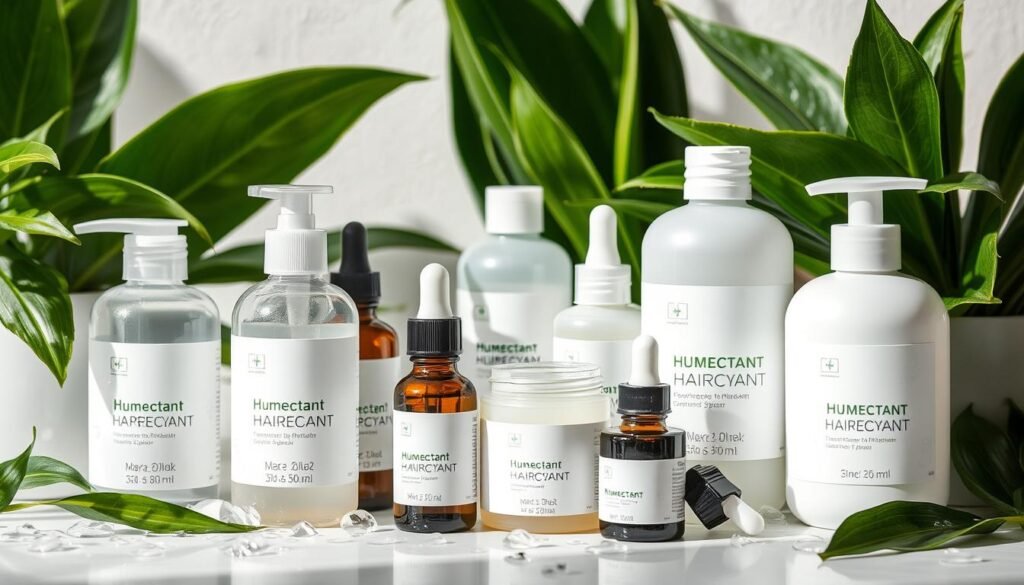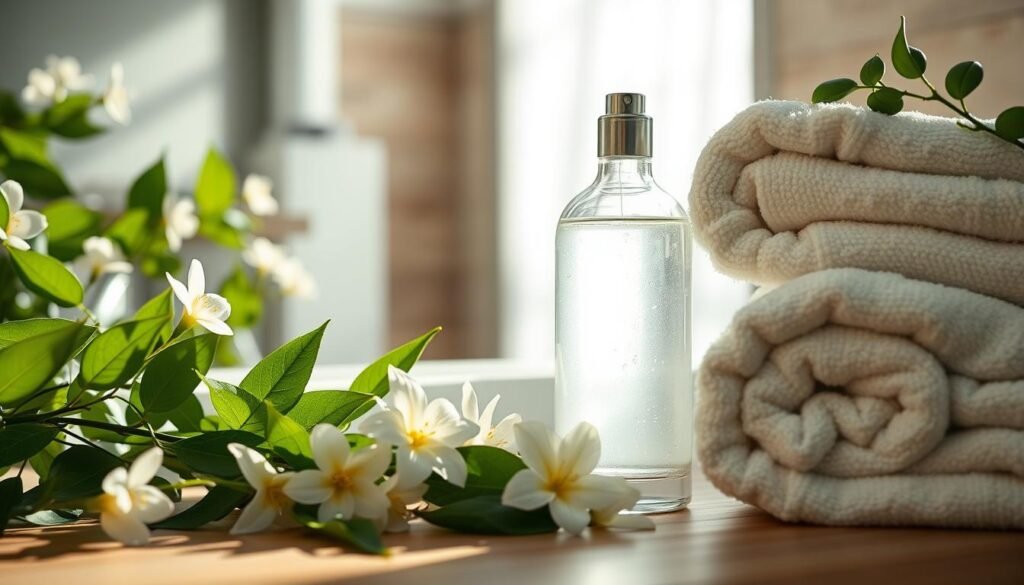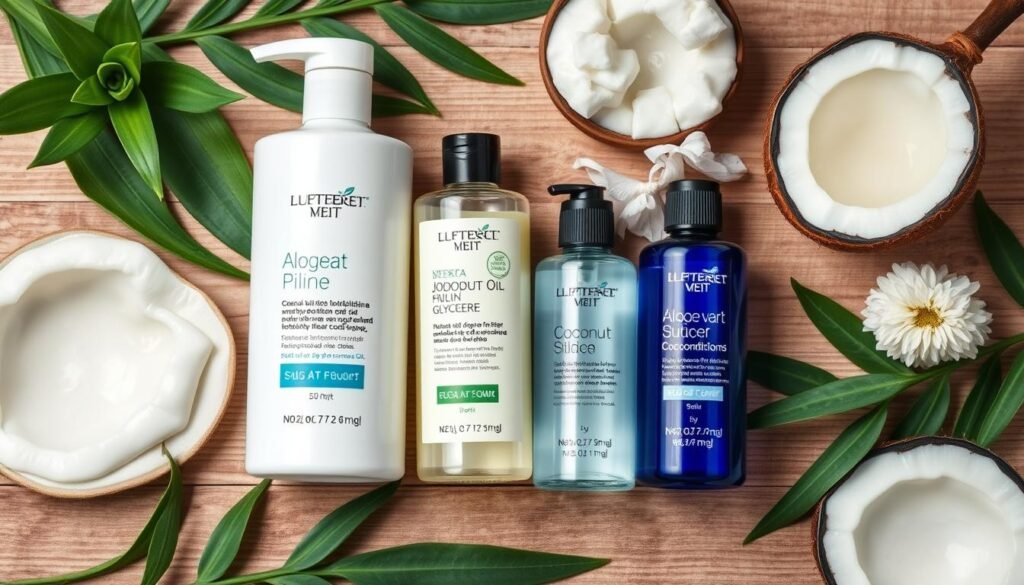A 2017 study found glycerin can boost skin barrier function. It keeps hydration up for 24 hours. This makes glycerin a top choice in moisturizing hair products. Its ability to pull moisture from the air helps nourish hair and scalp. We’ll look into its benefits, uses, and alternatives. This shows how good it is for solving dry scalp problems.
Key Takeaways
- Glycerin effectively boosts scalp hydration, preventing moisture loss.
- It is ideal for all hair types, particularly benefiting those with dryness or frizz.
- Glycerin can be incorporated into both store-bought and DIY hair care products.
- Using glycerin can enhance the health of the scalp, reducing dandruff and irritation.
- This ingredient has been rated as safe for both human health and the environment.
What is Glycerin?
Glycerin, also called glycerol, is clear and has no smell. It has a thick, syrupy feel. It’s a sugar alcohol, setting it apart as a unique natural substance. Its main feature is pulling in water. This makes it vital for hydrating the skin and hair. The Environmental Working Group gives glycerin an “A” for safety. This means it’s gentle and good for many uses.
Definition and Properties
Glycerin has a special talent for drawing water. This makes it perfect for hair products aimed at dry, brittle hair. It boosts hair’s moisture, leading to stronger, healthier hair. It also helps reduce hair breakage.
Sources of Glycerin
Glycerin comes from plants like palm, soybean, and coconut. It’s also made from animal fats or petroleum. It’s used in many beauty and personal care items. This adds hydration benefits to them.
Benefits of Glycerin for Hair
Glycerin is great for different hair types. It deeply hydrates, reduces breakage, and makes hair look better. In hair care products, it nourishes the hair and scalp well.
Deep Hydration for All Hair Types
Glycerin is amazing at moisturizing all hair types. It pulls moisture into the hair, which is great for dry or curly locks. This helps hair grow in a healthy way.
Products with glycerin make hair soft, smooth, and hydrated. Glycerin for Scalp Moisture is important for shiny, lively hair.
Preventing Hair Breakage
Regular use of glycerin makes hair stronger and prevents breakage. It locks in moisture, so hair is less brittle. This leads to less split ends and stronger hair.
Improving Hair Glossiness and Texture
Glycerin also makes hair glossy and improves its texture. A 2017 study showed it makes hair look thicker and healthier. People wanting shiny hair choose moisturizing hair products with glycerin. It makes hair softer and easier to manage.
Glycerin for Scalp Moisture: Hydrate & Soothe
Dry scalp can cause itchiness and irritation. Using glycerin in hair care can help a lot. It keeps moisture in and protects against dryness. This makes glycerin key in Dry Scalp Remedies. It helps the scalp stay healthy in different environments.
Moisture Retention
Glycerin is great at keeping moisture. It forms a barrier that stops moisture loss. This keeps the scalp hydrated for a long time. A moist scalp means less flakiness and promotes healthy hair growth.
Reducing Itchiness and Irritation
Glycerin also reduces scalp itchiness and irritation. It’s especially good for curly or coily hair that gets dry. Glycerin’s soothing effects make the scalp feel better, improving hair care. It’s a key ingredient in products for Glycerin for Scalp Moisture.
Glycerin is priced at $40.00, offering great value. It works well for various hair types. Adding glycerin to your routine boosts scalp health and comfort.
Learn more about glycerin’s benefits: Glycerin in Hair Care Products.
How Glycerin Acts as a Humectant
Glycerin is key in hair care, attracting and keeping moisture in. It helps keep hair and scalp hydrated. Knowing how glycerin works can make your hair care better.
Mechanism of Moisture Attraction
Glycerin pulls water from the air into your hair and scalp. This is great in moderately humid conditions. When used in Humectant Haircare Products, it keeps hair moist and strong. Your hair looks softer and healthier.
Climate Considerations for Effectiveness
The weather affects how well glycerin works. In arid climates, it might take moisture from hair, causing dryness. Knowing this helps you get the best results. People should change how they use glycerin products based on the season and where they live. This way, you keep your hair moist and healthy.

Studies Supporting Glycerin’s Benefits
Many studies have shown the great benefits of glycerin, especially for scalp moisture and fighting dandruff. It’s known to help keep the scalp hydrated and reduce dandruff flaking. Let’s look into the research that backs up these claims.
Research on Scalp Hydration
Glycerin is proven to be an effective humectant, pulling moisture into the skin. This keeps the scalp hydrated all day. In one study, using glycerin on the scalp boosted moisture for 24 hours. This helps make the scalp healthier and improves hair condition.
Impact on Dandruff and Flaking
Studies show glycerin is great for treating dandruff, leading to better scalp moisture and less flaking. In a study by the National Institutes of Health, people used glycerin on their scalp three times a week. They saw a big drop in dandruff, proving how well it works. This research highlights that regular use of glycerin keeps the scalp in good shape, with less dandruff.
Glycerin in Hair Care Products
Glycerin is key in many hair care items. It helps moisturizers work better. It pulls moisture into the scalp and hair. This is key for healthy hair. Brands like Lush and Verb use glycerin to boost hydration for all hair types.
Common Products Containing Glycerin
Today, we find many products with glycerin for hair needs. These include:
- Shampoos – they clean and moisturize.
- Conditioners – they add moisture and make hair easy to comb.
- Hair Masks – these have a lot of glycerin for deep moisture treatments.
- Styling Products – they keep your style in place and hydrate hair.
Glycerin’s ability to attract water reduces frizz, dryness, and breakage.
Homemade Glycerin Treatments
You can make your own hair treatments with glycerin. Simple mixes bring big benefits, like:
- Glycerin and Aloe Vera: Makes hair shiny and moist.
- Glycerin and Coconut Oil: Helps hair get strong and grow.
- Glycerin and Rose Water: Nourishes hair and soothes the scalp.
These mixes use glycerin and natural ingredients for more moisture. They help a lot with dry hair and scalp.

How to Use Glycerin Effectively
To get the best from glycerin for scalp moisture, it’s crucial to know how to use it right. This natural ingredient not only keeps moisture in but also boosts scalp health. To hydrate well and ease dryness, follow recommended ways.
Recommended Dilution Ratios
Glycerin works best when diluted correctly. Mix 1 part glycerin with 2 parts water or a carrier oil. This mix is light and soaks into the scalp well. Depending on your scalp’s needs, you might tweak this mix, but it’s a good base to begin with.
Best Practices for Application
To see great results, put glycerin on damp hair. This helps lock in moisture without making hair heavy. A spray of glycerin makes application simple and spreads it evenly.
Using glycerin in a hair mask also helps. Leave it on for about 40 minutes. Do this weekly for deep hydration. For an extra boost, mix glycerin with oils like coconut or olive oil.
Glycerin’s benefits can help keep your scalp moist and tackle dryness, itching, and irritation. To learn more about scalp health, look at more resources here.
Alternative Ingredients for Scalp Hydration
While glycerin is great for scalp hydration, many other natural ingredients can also moisturize well. These options don’t just lock in moisture. They also feed the scalp. This leads to healthier hair growth and better overall hair condition. Adding various scalp nourishing ingredients to hair products helps fight dryness effectively.
Natural Hair Conditioners
Natural conditioners like aloe vera, coconut oil, and honey are key in hair care today. They have special qualities that work well with glycerin:
- Aloe Vera: It’s full of vitamins and amino acids, offering hydration and calming the scalp.
- Coconut Oil: Deeply moisturizing, it adds shine and tames frizz.
- Honey: As a natural moisture magnet, honey makes hair soft and easy to manage.
Other Humectants in Hair Care
There’s more to moisture than just glycerin and the conditioners mentioned. Different humectants like Pro-Vitamin B5 (Panthenol) and granulated sugar are also useful. They have their own perks:
- Pro-Vitamin B5: It boosts moisture, strengthens hair, and adds elasticity.
- Granulated Sugar: This exfoliant improves scalp circulation, promoting healthy hair.

Potential Side Effects of Glycerin
Knowing the side effects of glycerin is key for those using it on their hair. While it’s mostly safe, some people may react badly. It’s smart to test it on a small area first, particularly if your skin is damaged.
Allergic Reactions and Skin Sensitivity
Sometimes, glycerin can cause allergic reactions, like contact dermatitis. Signs of this include:
- Skin irritation
- Rashes
- Swelling
- Itching
Even though bad reactions to glycerin are unusual, it’s important to see a doctor if your skin starts to change. Always check what’s in your products to stay safe. In damp weather, glycerin might make your skin lose moisture, leaving your hair hard to manage.
Interactions with Hair Products
Glycerin usually is fine with most hair stuff, but sometimes it doesn’t mix well. For example, it might feel oily if used with lots of emollients. Remember, everyone’s hair is different, so see how glycerin affects yours.
| Possible Reaction | Description | Preventive Measures |
|---|---|---|
| Skin Irritation | Burning or stinging sensation | Patch test before use |
| Rash | Redness and swelling on application | Check ingredient lists for allergens |
| Frizz | Hair appears unmanageable in high humidity | Adjust usage based on climate |
Glycerin as a Solution for Scalp Conditions
Dealing with scalp problems can be tough. Glycerin is a key player in solving these issues. It tackles folliculitis, eczema, and psoriasis effectively. Using glycerin can make a big difference in the health and comfort of your scalp.
Effectiveness Against Folliculitis
Folliculitis is uncomfortable, often due to irritated or infected hair follicles. Glycerin is great for easing this discomfort. Studies show glycerin is better than hyaluronic acid for keeping skin moist. This helps soothe symptoms like itching and stops fungal problems from getting worse.
Help for Eczema and Psoriasis
Eczema and psoriasis sufferers deal with constant skin dryness. Glycerin’s moisture helps calm irritated areas and prevent outbreaks. According to the National Institutes of Health, glycerin boosts scalp hydration for a full day, cutting down itchiness. Using glycerin regularly also improves the scalp’s protective layer. This is key in reducing dandruff and flakes, especially for sensitive scalps.
Store-Bought vs. DIY Glycerin Products
Choosing between store-bought and homemade glycerin products is crucial for hair care. Each has its own pros and cons. Knowing these can help you make a good choice for your hair.
Pros and Cons of Commercial Products
Store-bought glycerin hair care offers convenience and proven results. These products hydrate and have benefits like fighting dandruff. But they might have things in them you don’t like, such as artificial stuff.
- Pros of Commercial Products:
- They are specifically made to work well.
- They usually have extra good ingredients.
- You don’t have to make them yourself.
- Cons of Commercial Products:
- They might have fake additives.
- They can cost more than making your own.
Easy DIY Glycerin Recipes for Hair
Creating your own glycerin treatments can save money and let you pick your ingredients. Popular mixes include hair masks and leave-in conditioners with aloe vera and rose water. These homemade options help keep your hair moist and healthy.
- Popular DIY Recipes:
- Glycerin and Aloe Vera Hair Mask
- Rose Water and Glycerin Leave-In Conditioner
- Glycerin Hair Moisturizing Spray
When making your own hair products, be sure to use pure ingredients and mix them correctly. This prevents bad reactions. You can try different mixtures to see what’s best for your hair type. This way, your hair care is both nourishing and personalized.
Conclusion
Glycerin is a key player in hair care. It shines especially in keeping the scalp moist. Its structure, C₃H₈O₃, helps it draw moisture from the air. Glycerin covers the hair and scalp with a light shield. This keeps moisture levels just right, helping hair stay healthy and full of life.
If you’re looking to keep your hair well-hydrated, glycerin is a smart choice. It’s a boon for curly and textured hair, fighting frizz and defining curls. It also makes hair more flexible. Plus, glycerin soothes dry, irritated scalps, laying the groundwork for strong hair growth.
When picking hair hydration products, think about the humidity and the glycerin mix in them. Applying glycerin the right way is crucial. Using glycerin-based masks or treatments can greatly boost your hair care routine. This can lead to healthier, more vibrant hair.